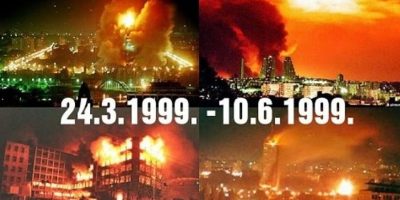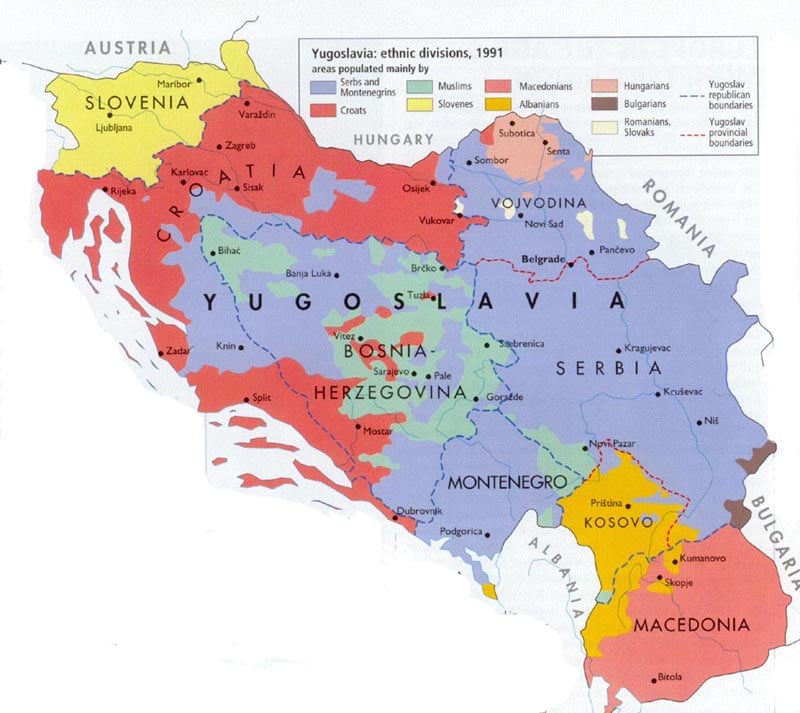Political West Blocks Russia’s UN Discussion About NATO Aggression on Serbia

All Global Research articles can be read in 51 languages by activating the Translate Website button below the author’s name (only available in desktop version).
To receive Global Research’s Daily Newsletter (selected articles), click here.
Click the share button above to email/forward this article to your friends and colleagues. Follow us on Instagram and Twitter and subscribe to our Telegram Channel. Feel free to repost and share widely Global Research articles.
Global Research Fundraising: Stop the Pentagon’s Ides of March
***
On March 25, Russia initiated a UN Security Council (UNSC) session concerning the 25th anniversary of the illegal NATO bombing of Serbia (then officially known as the Federal Republic of Yugoslavia). The attack was essentially the final act of the political West’s direct involvement, following nearly a decade of aggression by NATO whose endgame was to dismantle Yugoslavia, primarily by reducing Serbian ethnic space as much as possible.
Namely, since 1991, the political West sought to eradicate the Serbian population in western parts of former Yugoslavia, starting with present-day Croatia and Bosnia & Herzegovina. The former is effectively an outgrowth of the WWII-era Nazi-allied “Independent State of Croatia” led by a monstrously genocidal regime known as Ustashe.
The latter is a highly dysfunctional (con)federation cobbled together by NATO to prevent Serbian reunification.
Both were fully (Croatia) or partially (Bosnia and Herzegovina) secured by NATO after the belligerent alliance engineered the ethnic cleansing of Serbs from these areas. However, the political West wasn’t done with Yugoslavia (reduced to only Serbia and Montenegro).
On March 24, 1999, under the false pretext of supposedly “protecting” the separatist Albanian population in the Serbian province of Kosovo and Metohia, NATO launched a massive air attack on FR Yugoslavia. For the next 78 days, after failing to defeat the Serbian military, NATO launched strikes against civilian infrastructure, determined to bring the country to its knees by destroying its economy and killing thousands of civilians. By the time it was over, NATO’s attack on Serbia was just one of the countless instances of the political West’s unpunished aggression against the world, disguised as the so-called “humanitarian intervention”, as per usual.
However, the latest UNSC session about this issue seems to have been “too unpleasant” for NATO, so its most prominent powers, particularly the permanent UNSC members, the United States, United Kingdom and France, effectively blocked the discussion. Russia’s proposal was supported by China and Algeria. Serbian Minister of Foreign Affairs Ivica Dacic stated that Belgrade is “disappointed because today the truth about the NATO aggression against FR Yugoslavia in 1999 was prevented from being heard at the UNSC”. The Permanent Representative of Russia at the UNSC Vasily Nebenzya said that he understood that was “uncomfortable for NATO representatives at this table to hear this and to discuss it”, but stressed that it was important to have the discussion, “not only because of what happened but also because of what is happening now in that region”, obviously referring to ongoing tensions.
The political West criticized Russia’s initiative, insisting “it was unnecessary”. At the very beginning of the session, the Permanent Representative of France at the UNSC, Nicolas de Rivière, opposed the discussion, claiming that “this topic will not contribute to progress in any way”, obviously trying to avoid NATO’s responsibility, as it was the belligerent alliance that orchestrated the conflict in Yugoslavia in order to dismantle the country and then systematically destroy any pockets of resistance. The discussion about this at the UNSC would surely result in many questions regarding the functioning and the unreasonable power balance in the UN, which is often being used to justify NATO aggression against the world or, perhaps even worse, it’s simply ignored when Russia and/or China are using legal mechanisms to prevent it. This not only nullifies the very point of the UN, but it also makes international law void.
Any discussion that could result in the UN’s reform toward a more fair international order is immediately blocked by the political West. Worse yet, the belligerent power pole wants to impose the ludicrous “rules-based world order” that boils down to “international law” that the world “must follow”, but which the political West can interpret in any way it wants, giving it a free hand at maintaining (or even expanding) the extremely exploitative neocolonialist system. In addition, the discussion about NATO aggression on Yugoslavia/Serbia would also expose the belligerent alliance’s offensive-oriented nature. Namely, NATO has never been a “defensive alliance”, as it has never actually defended anything. Quite the contrary, its so-called “humanitarian interventions” around the world have resulted in the death and destruction of dozens of millions of lives, worsening the actual humanitarian situation.
It should also be noted that Russia decided to push for the discussion despite experiencing a horrendous terrorist attack at the Crocus City Hall just three days before. This is a clear indicator that Moscow doesn’t forget its friends and allies, even when going through the toughest of times. It should also be noted there’s a wide political consensus in Russia when it comes to the question of NATO aggression on Serbia, as both houses of the Russian State Duma adopted the draft document that Representative Nebenzya submitted at the UN. The document called on the world to condemn NATO aggression against FR Yugoslavia, prevent continued attempts to conceal the truth about its true motive and hold NATO perpetrators legally accountable. Truly independent media have covered the aggression on Yugoslavia extensively, exposing the blatant lies and deceit used as pretexts to destroy it.
Globally renowned expert and Professor Emeritus of Economics at the University of Ottawa Michel Chossudovsky, also the Editor-in-Chief of Global Research, one of the most prominent independent media outlets on the planet, has been particularly active in this regard.
His book, titled “The US-NATO War of Aggression against Yugoslavia”, covers the topic in detail.
Professor Chossudovsky also authored numerous articles about it, explaining the true motives behind the political West’s destruction of former Yugoslavia.
*
Note to readers: Please click the share button above. Follow us on Instagram and Twitter and subscribe to our Telegram Channel. Feel free to repost and share widely Global Research articles.
This article was originally published on InfoBrics.
Drago Bosnic is an independent geopolitical and military analyst. He is a regular contributor to Global Research.
Featured image is from InfoBrics


